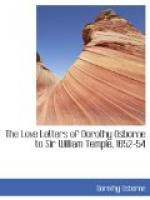We have a lady new come into this country that I pity, too, extremely. She is one of my Lord of Valentia’s daughters, and has married an old fellow that is some threescore and ten, who has a house that is fitter for the hogs than for her, and a fortune that will not at all recompense the least of these inconveniences. Ah! ’tis most certain I should have chosen a handsome chain to lead my apes in before such a husband; but marrying and hanging go by destiny, they say. It was not mine, it seems, to have an emperor; the spiteful man, merely to vex me, has gone and married my countrywoman, my Lord Lee’s daughter. What a multitude of willow garlands I shall weave before I die; I think I had best make them into faggots this cold weather, the flame they would make in a chimney would be of more use to me than that which was in the hearts of all those that gave them me, and would last as long. I did not think I should have got thus far. I have been so persecuted with visits all this week I have had no time to despatch anything of business, so that now I have done this I have forty letters more to write; how much rather would I have them all to you than to anybody else; or, rather, how much better would it be if there needed none to you, and that I could tell you without writing how much I am
Yours.
Letter 33.—Sir Thomas Peyton, we must remember, had married Dorothy’s eldest sister; she died many years ago, and Sir Thomas married again, in 1648, one Dame Cicely Swan, a widow, whose character Dorothy gives us.
Lord Monmouth was the eldest son of the Earl of Monmouth, and was born in 1596. He was educated at Exeter College, Oxford. His literary work was, at least, copious, and included some historical writing, as well as the translations mentioned by Dorothy. He published, among other things, An Historical Relation of the United Provinces, a History of the Wars in Flanders, and a History of Venice.
Sir John Suckling, in the following doggerel, hails our noble author with a flunkey’s enthusiasm,—
It is so rare and new a thing to see
Aught that belongs to young nobility
In print, but their own clothes, that we must praise
You, as we would do those first show the ways
To arts or to new worlds.




